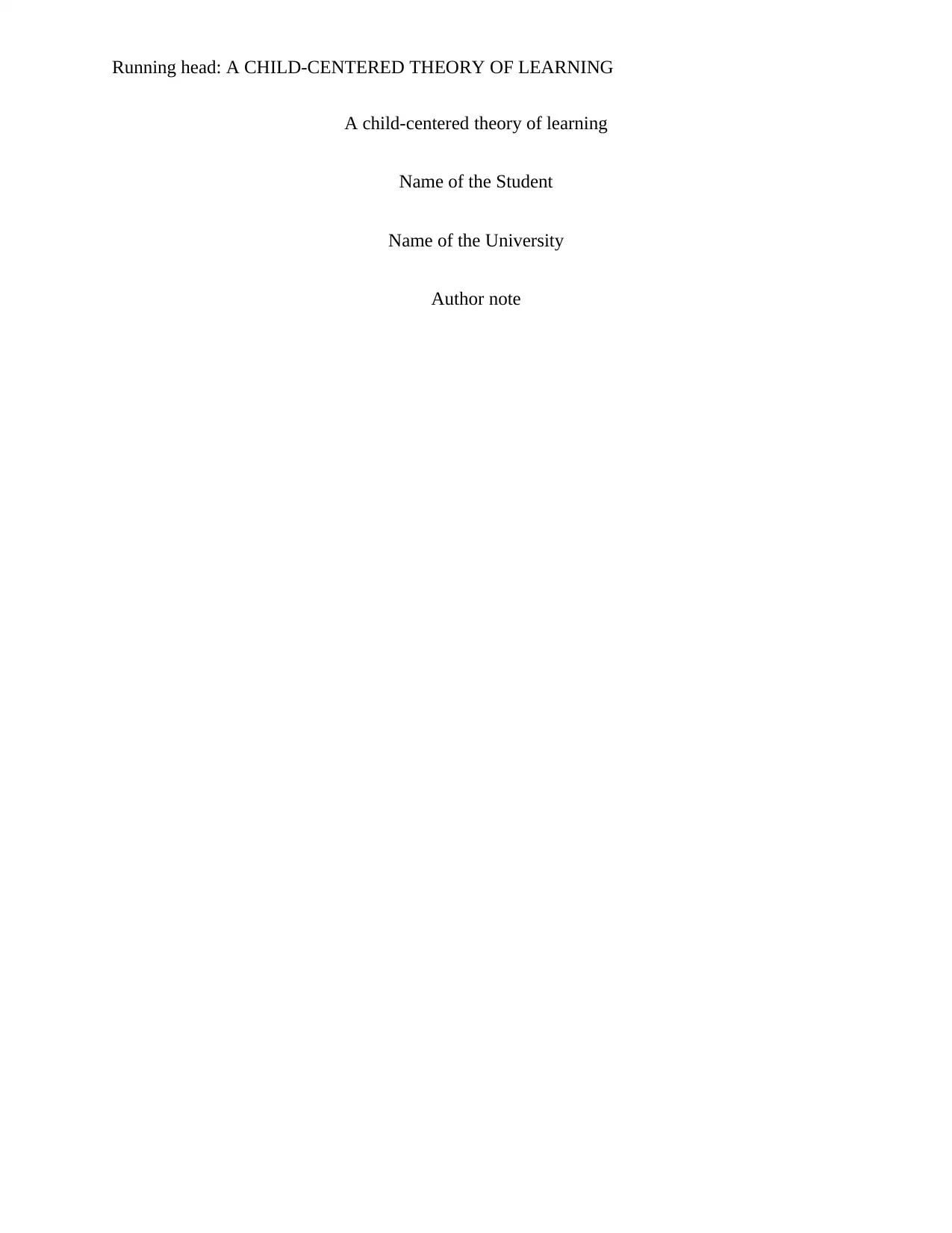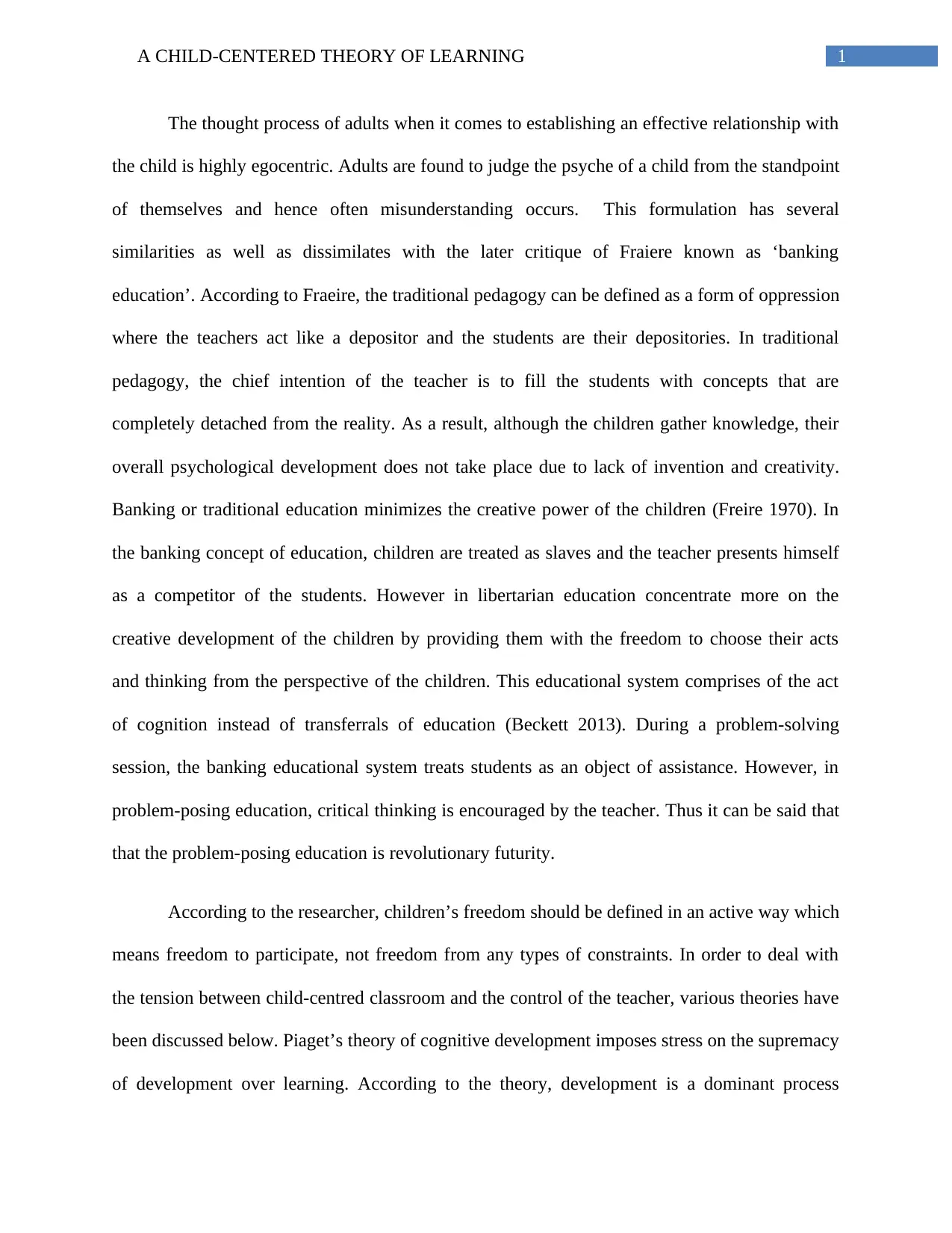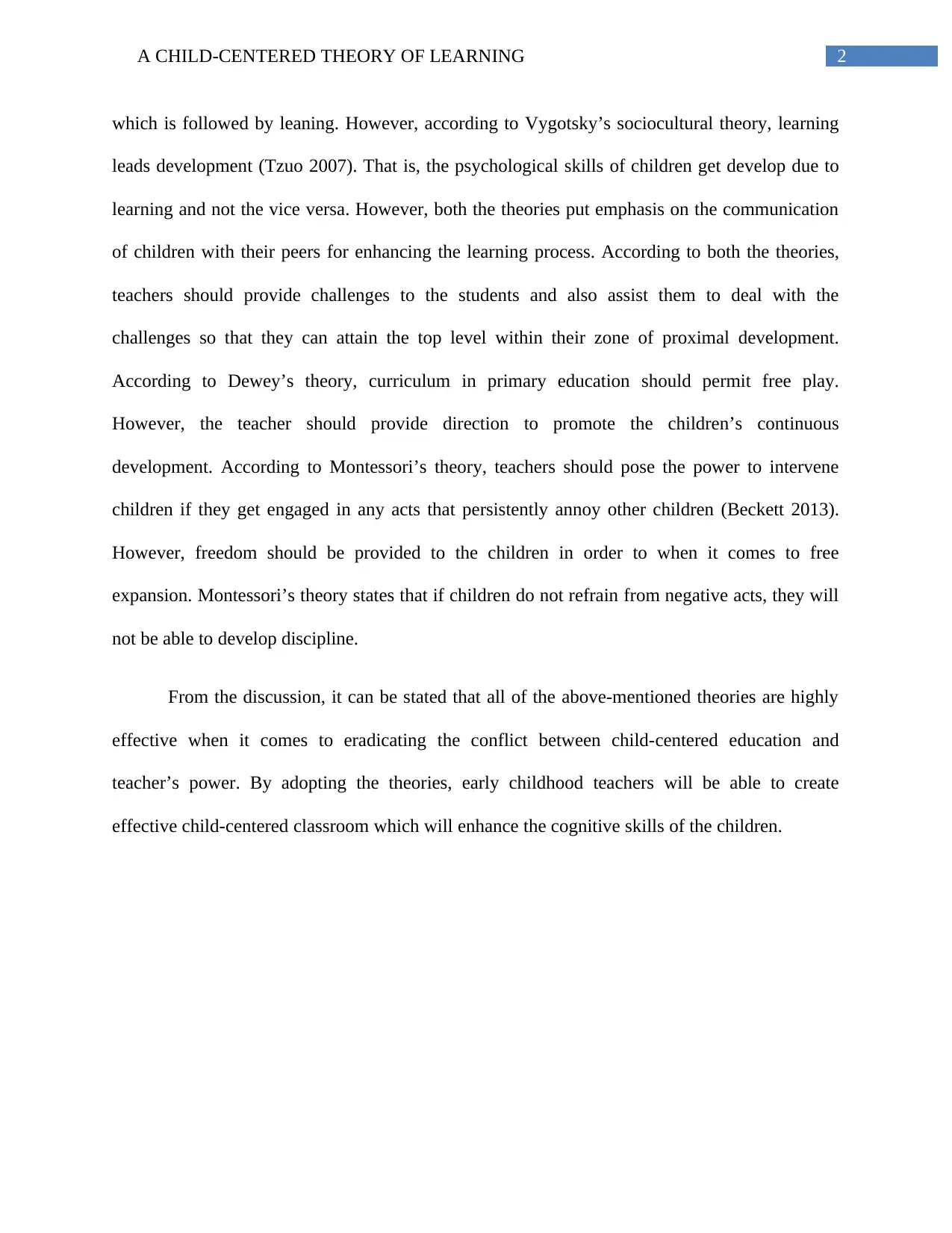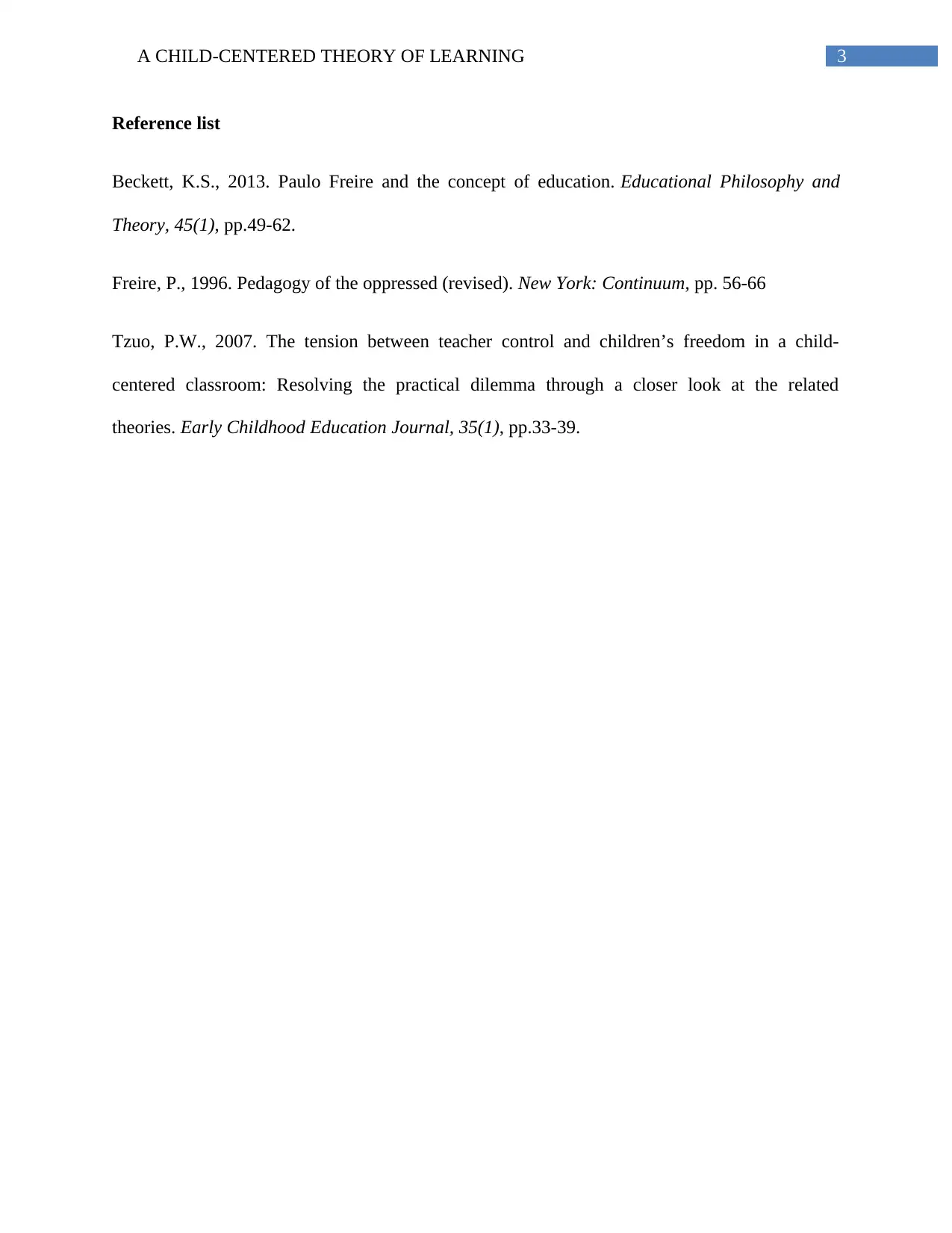A Child-Centered Theory of Learning: Freedom and Teacher Control
VerifiedAdded on 2023/06/13
|4
|764
|139
Essay
AI Summary
This essay delves into the complexities of child-centered learning, examining the inherent tension between teacher control and children's freedom. It critiques the traditional 'banking education' model, advocating for a problem-posing approach that fosters creativity and critical thinking. The essay explores various theoretical perspectives, including Piaget's emphasis on development preceding learning and Vygotsky's sociocultural theory highlighting learning's role in development. It further discusses Dewey's advocacy for free play with teacher guidance and Montessori's balanced approach to freedom and discipline. The essay concludes that integrating these theories can help early childhood educators create effective child-centered classrooms that enhance children's cognitive skills.

Running head: A CHILD-CENTERED THEORY OF LEARNING
A child-centered theory of learning
Name of the Student
Name of the University
Author note
A child-centered theory of learning
Name of the Student
Name of the University
Author note
Paraphrase This Document
Need a fresh take? Get an instant paraphrase of this document with our AI Paraphraser

1A CHILD-CENTERED THEORY OF LEARNING
The thought process of adults when it comes to establishing an effective relationship with
the child is highly egocentric. Adults are found to judge the psyche of a child from the standpoint
of themselves and hence often misunderstanding occurs. This formulation has several
similarities as well as dissimilates with the later critique of Fraiere known as ‘banking
education’. According to Fraeire, the traditional pedagogy can be defined as a form of oppression
where the teachers act like a depositor and the students are their depositories. In traditional
pedagogy, the chief intention of the teacher is to fill the students with concepts that are
completely detached from the reality. As a result, although the children gather knowledge, their
overall psychological development does not take place due to lack of invention and creativity.
Banking or traditional education minimizes the creative power of the children (Freire 1970). In
the banking concept of education, children are treated as slaves and the teacher presents himself
as a competitor of the students. However in libertarian education concentrate more on the
creative development of the children by providing them with the freedom to choose their acts
and thinking from the perspective of the children. This educational system comprises of the act
of cognition instead of transferrals of education (Beckett 2013). During a problem-solving
session, the banking educational system treats students as an object of assistance. However, in
problem-posing education, critical thinking is encouraged by the teacher. Thus it can be said that
that the problem-posing education is revolutionary futurity.
According to the researcher, children’s freedom should be defined in an active way which
means freedom to participate, not freedom from any types of constraints. In order to deal with
the tension between child-centred classroom and the control of the teacher, various theories have
been discussed below. Piaget’s theory of cognitive development imposes stress on the supremacy
of development over learning. According to the theory, development is a dominant process
The thought process of adults when it comes to establishing an effective relationship with
the child is highly egocentric. Adults are found to judge the psyche of a child from the standpoint
of themselves and hence often misunderstanding occurs. This formulation has several
similarities as well as dissimilates with the later critique of Fraiere known as ‘banking
education’. According to Fraeire, the traditional pedagogy can be defined as a form of oppression
where the teachers act like a depositor and the students are their depositories. In traditional
pedagogy, the chief intention of the teacher is to fill the students with concepts that are
completely detached from the reality. As a result, although the children gather knowledge, their
overall psychological development does not take place due to lack of invention and creativity.
Banking or traditional education minimizes the creative power of the children (Freire 1970). In
the banking concept of education, children are treated as slaves and the teacher presents himself
as a competitor of the students. However in libertarian education concentrate more on the
creative development of the children by providing them with the freedom to choose their acts
and thinking from the perspective of the children. This educational system comprises of the act
of cognition instead of transferrals of education (Beckett 2013). During a problem-solving
session, the banking educational system treats students as an object of assistance. However, in
problem-posing education, critical thinking is encouraged by the teacher. Thus it can be said that
that the problem-posing education is revolutionary futurity.
According to the researcher, children’s freedom should be defined in an active way which
means freedom to participate, not freedom from any types of constraints. In order to deal with
the tension between child-centred classroom and the control of the teacher, various theories have
been discussed below. Piaget’s theory of cognitive development imposes stress on the supremacy
of development over learning. According to the theory, development is a dominant process

2A CHILD-CENTERED THEORY OF LEARNING
which is followed by leaning. However, according to Vygotsky’s sociocultural theory, learning
leads development (Tzuo 2007). That is, the psychological skills of children get develop due to
learning and not the vice versa. However, both the theories put emphasis on the communication
of children with their peers for enhancing the learning process. According to both the theories,
teachers should provide challenges to the students and also assist them to deal with the
challenges so that they can attain the top level within their zone of proximal development.
According to Dewey’s theory, curriculum in primary education should permit free play.
However, the teacher should provide direction to promote the children’s continuous
development. According to Montessori’s theory, teachers should pose the power to intervene
children if they get engaged in any acts that persistently annoy other children (Beckett 2013).
However, freedom should be provided to the children in order to when it comes to free
expansion. Montessori’s theory states that if children do not refrain from negative acts, they will
not be able to develop discipline.
From the discussion, it can be stated that all of the above-mentioned theories are highly
effective when it comes to eradicating the conflict between child-centered education and
teacher’s power. By adopting the theories, early childhood teachers will be able to create
effective child-centered classroom which will enhance the cognitive skills of the children.
which is followed by leaning. However, according to Vygotsky’s sociocultural theory, learning
leads development (Tzuo 2007). That is, the psychological skills of children get develop due to
learning and not the vice versa. However, both the theories put emphasis on the communication
of children with their peers for enhancing the learning process. According to both the theories,
teachers should provide challenges to the students and also assist them to deal with the
challenges so that they can attain the top level within their zone of proximal development.
According to Dewey’s theory, curriculum in primary education should permit free play.
However, the teacher should provide direction to promote the children’s continuous
development. According to Montessori’s theory, teachers should pose the power to intervene
children if they get engaged in any acts that persistently annoy other children (Beckett 2013).
However, freedom should be provided to the children in order to when it comes to free
expansion. Montessori’s theory states that if children do not refrain from negative acts, they will
not be able to develop discipline.
From the discussion, it can be stated that all of the above-mentioned theories are highly
effective when it comes to eradicating the conflict between child-centered education and
teacher’s power. By adopting the theories, early childhood teachers will be able to create
effective child-centered classroom which will enhance the cognitive skills of the children.
⊘ This is a preview!⊘
Do you want full access?
Subscribe today to unlock all pages.

Trusted by 1+ million students worldwide

3A CHILD-CENTERED THEORY OF LEARNING
Reference list
Beckett, K.S., 2013. Paulo Freire and the concept of education. Educational Philosophy and
Theory, 45(1), pp.49-62.
Freire, P., 1996. Pedagogy of the oppressed (revised). New York: Continuum, pp. 56-66
Tzuo, P.W., 2007. The tension between teacher control and children’s freedom in a child-
centered classroom: Resolving the practical dilemma through a closer look at the related
theories. Early Childhood Education Journal, 35(1), pp.33-39.
Reference list
Beckett, K.S., 2013. Paulo Freire and the concept of education. Educational Philosophy and
Theory, 45(1), pp.49-62.
Freire, P., 1996. Pedagogy of the oppressed (revised). New York: Continuum, pp. 56-66
Tzuo, P.W., 2007. The tension between teacher control and children’s freedom in a child-
centered classroom: Resolving the practical dilemma through a closer look at the related
theories. Early Childhood Education Journal, 35(1), pp.33-39.
1 out of 4
Related Documents
Your All-in-One AI-Powered Toolkit for Academic Success.
+13062052269
info@desklib.com
Available 24*7 on WhatsApp / Email
![[object Object]](/_next/static/media/star-bottom.7253800d.svg)
Unlock your academic potential
Copyright © 2020–2026 A2Z Services. All Rights Reserved. Developed and managed by ZUCOL.





